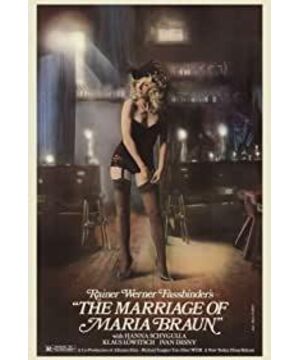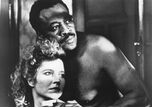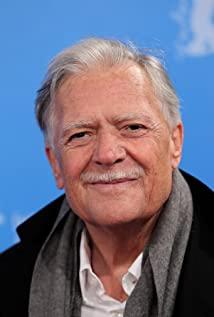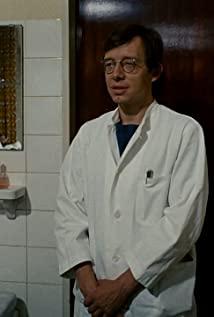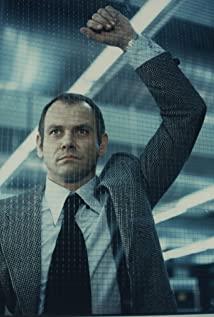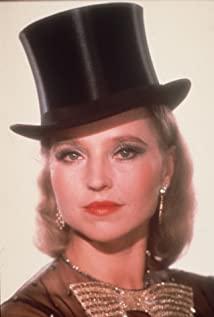Like ordinary people, Abin has limitations. Die Ehe der Maria Braun, despite breaking into the mainstream, still has limitations.
A scene in the amusement hall of "In einem Jahr mit 13 Monden" is calm, mature, and delicate, with exquisite lighting, brilliant colors and atmosphere [32:53-37:40]. Very modern, light and shadow, camera angles, stained glass on the ceiling, arrows, avant-garde enough for the eye of the audience in 1978 [32:53-33:10]. The chasing/exploding footage of electric sims was way ahead of its time. New technologies are aggressively attacking humans [33:32-33:53]. The use of mirrors/mirrors is remarkable. The light is thoughtful, the environment is soft, the tones are harmonious, and the patterns are bold. The thick and curved yellow and dark red "hui" pattern on the black background is shocking and not too jumpy [34:20-37:40]. But in terms of performance, the stage marks are still too heavy, and the nun of the monastery garden has recited such a long line of lines and has been walking in the direction of zombies, which is really appalling.
CD (cross-dressing) may be fancier gay, and TG (TransGender/transgender) is definitely the most thorough, hardcore, and uncompromising gay.
Abin's characters are obviously full in "13", and the excavation and shaping of the heart is much deeper than that of "Fear Devouring the Soul". Violence, estrangement, incomprehension, communication failure, unemployment, loneliness, helplessness, predicament, self-identity confusion. What does "In einem Jahr mit 13 Monden" mean? I think it means there is one month of extra ["excess fat"]. month, negative. Thirteen, taboo numbers, unlucky, related to death. The gods meet, and the thirteenth is the devil. "Thirteen" is considered to symbolize suffering and misfortune. Elvira denied herself and was rejected by the world. Losing his job in the slaughterhouse, Elvira, a creature, has been thrown to the lowest level in the actual society. He was trained to learn slaughter and nothing else. Butcher TG, how did Abin come up with it?
Everything is lost. Positive organs, positive functions, positive temperament, positive physical characteristics, occupation, money, romance, friendship, hope. Not at all. Lost friendship, lost lover Anton, lost health [obesity caused by alcoholism], lost dream [does he have a dream? Dreaming of a biological mother's arms? Acceptance of the biological father? ], loss of acceptance/acceptance of writers, loss of hope.
Elvira is low-key and kind. Apologizing to this and that [boyfriend, wife, writer, Anton], they are all concessions, but they are all ineffective and unacceptable. Erwin went to Casablanca for sex reassignment surgery and became Elvira. When she returned to Frankfurt, she was rejected by a series of rejections. All possibilities were closed to her, including the prostitution buyer beating her at the beginning, and her cohabitation boyfriend being violent and leaving without mercy. , Strangers in the video game store drive Elvira away, biological parents abandon, wife and daughter do not come back, prostitute Zola prostitutes Anton [There are film critics that Anton has sex with Zura. Must be blind. Who is "making love" with the banknotes in their hands? ] Elvira understood it all as a blow. It's done, Elvira can't go back to being a man again. She wears men's clothes at the beginning and cuts her hair at the end to express her desire to "return to a man", but even if Elvira regrets the sex change operation, there is no way out. Elvira is also struggling financially. How much savings can an orphaned, unemployed butcher have for two expensive surgeries? Long-term use of hormones is required after surgery. Elvira does not have the conditions to perform surgery to restore the male body, not to mention that if a woman becomes a man again, her positive function may not be restored. Near the end of the film, the writer said seriously "Elvira, you are not stupid". This is the only positive comment Elvira has heard in the whole article. Unfortunately, this sentence is not helpful. Elvira is already heartbroken and can't see the slightest hope. It is worse than the AIDS Andrew in "Philadelphia". Elvira has no way out, there is only a dead end, and it is impossible to say that she will die, so she just doesn't play. This approach seems simple now. Destruction of others and/or self-destruction are lazy ways of dealing with irreconcilable contradictions.
Do animals commit suicide? Well, generally speaking, it is not common, but there are also whales stranded and cattle jumping off cliffs. Whales are courting death because the magnetic field disorder causes the ultrasound navigation system in the body to malfunction. The cliff-jumping cattle may have seen a ghost, I guess.
The reason for Elvira's suicide is that she is extremely dissatisfied with the status quo and unable to reverse it, the pressure is too heavy and there is no channel to pass on it, the dilemma is not human, it is negative, and it maintains her dignity. An extreme form of unyielding, a struggle against fate. Extremely isolated, extremely helpless. The state of helplessness is one of the most embarrassing predicaments of human beings. In fact, the ability of human beings to survive has been greatly degraded and is far inferior to that of animals. The problem is unsolved, and it is easy to seek relief. Every life has dignity and is a continuation of the parents' lives, and suicide is the highest level of all denials, the last chance to show one's own strength. But in the final analysis, suicide is negative and anti-life.
"Cry out for deliverance" Cry -- loud, unyielding, swearing to the death. For liberation - the world is too hard and too tired, I don't want to be tortured any more, and death is liberation. "You don't understand the world of animals. Blood, death, that's the meaning of animal life, and death, that means life. For animals, when they know they're going to die, they wait alone and silently for death. , smelling death, and knowing that it would be beautiful. I used to feel disgusting when I was young, but now I understand the world more and more..." This paragraph is a typical death logic, it is fast in a strange circle Rotating, plausible, and self-justifying, you can't actually jump out of the plane of the turntable of death and examine the turntable from the height above the turntable. This is a hymn to death [not a hymn to the butcher], this is Abin's attempt to take a low-angle, animal perspective to see life, society, and death. Negative deeply, deeply despairing. Qu Yuan, Lu Zhaolin, Maupassant, Jack London, Yesenin, Wang Guowei, Mayakovsky, Woolf, Zweig, Fadeev, Lao She, Fu Lei, Yang Shuo, Mishima Yukio, Akutagawa Ryunosuke, Kawabata Yasunari, Sanmao, Haizi, Xu Chi, Zhang Chunru, Hemingway, Allende, Saigo Takamori [At that time, Saigo was injured, and I asked Beppu Jinsuke to help, so it should be counted]. There are too many, too many to enumerate. They are all brave people with great wisdom and weak people who escape from reality [see below for specific reasons].
In the second year of "13" (79 years), "Die Ehe der Maria Braun" was released. Two heavyweights who influenced the plot died [Bill, Maria]. Death was used too easily, like antibiotics, overused. The husband returned unexpectedly and the good show was about to be staged. Abin arranged for Maria to shoot Bill to death with a wine bottle [38:21]; Maria's death is even more bizarre, and I will elaborate later. First eight: Gottfried John who played Willi Klenze is the Anton Saitz in "13", who was born in 1942, and was still great in 2009.
One night plus half a day for the spring supper, the unfortunate husband goes to the front line, and life has never been absurd. However, there are many artificial decorations in this film. Maria goes to the bar and only sells wine and not meat as a saint, Bill as a saint, and deep in the end credits. In fact, these are all snake feet, which makes the works less than perfect. The country is like that, why does Maria stick to the moral archway? "... three million soldiers died on the German side, more than two million were wounded and maimed, and more than half a million died in air raids..." [Dieter Rapp, "German History - From the Ancient Empire to The Second Republic", Munich, 1985 Chinese edition, p. 325] "In the collapsed Germany there was widespread instability, each military government tried to restore order in its own way, and the Germans tried their best to spread the word throughout Germany. Overcoming difficulties in social chaos. Most people, as long as they do not flee west, live in the ruins of the residential area, and many people's spiritual world has become a rubble. Destiny, one meal never ends. Under these circumstances, they began to clear the ruins in the city and built the first temporary shelters. About five million houses were completely or partially blown up during the war.' 10 Men between the ages of four and sixty-five and women between the ages of fifteen and fifty . The scarcity of clothing, shoes and food that occurred became more severe. Industrial production in 1946 was only 33% of what it was in 1936 before the war. The food supply situation was getting tighter and starvation became a major problem in occupied Germany. The food that can only be bought in a long queue at the door of the store can provide an average of 1,000 to 1,500 calories per day. According to a survey by UN experts, the daily calorie intake per person should not be less than 2,600. One hundred and fifty calories. Potatoes and radishes replaced the often scarce bread, meat and sausages became rarities, and butter, cooking oil and margarine became rationed luxuries.” [ibid., p. 341]
A stack of men's clothes exchanged for three boxes of matches with Grandpa Berger. "Carl was last here in May 1941". This Carl is obviously Maria's dad. The man in the family was gone, Carl was killed in battle, and Carl's clothes were useless. In exchange for matches, he did not take pictures. Life is cruel and ruthless, people live like animals, and they have no time to be sentimental. It is said that after the bloody battle of Stalingrad, the bullets were smashed with teeth. The front line is brutal, and the rear is another kind of cruelty. Women sell laughs and meat, and the elderly Grandpa Berger does not need to go to the battlefield, but needs clothes to keep out the cold at home. The size is not suitable, don't pick it, wear it inside. When everyone was discussing whether to support Germany's rebuilding of the army, the elderly Grandpa Berger kept chasing the pot of mashed potatoes in Willi Klenze's hand to eat [54:40], no time for dignity, no time for thinking, etiquette, morality, shame All the senses go to hell, people are so hungry they look like animals. When the war is fought to such an extent and the country and people's livelihood are destroyed to such an extent, what is morality? How much is a pound? It's better to write that Maria is not as good as her mother's life as a pig and a dog, she can't keep warm without eating matches, and then Maria becomes ill, her mother has pneumonia, and her high fever persists. The pimp barter trade pulled by the old mother herself, who pulled it? It is the old neighbor, or the Doctor played by Claus Holm, who knows the basics, at least is clean, and arranges for it to be aided and poverty-stricken; but they are all honest people, and they are so poor that they can't give money, and barter trade is very difficult. It's not going to be easy anymore. If you don't do it again and again, you can just find a capable man, such as the guy on the black market who masters logistics like a duck to water, such as the bar's fat pier manager, and then you can pick up the occupying army and pick up Bill, and you can see all kinds of people and so on. Unlike human nature, Bill is a hypocrite, John is a thief/give her money, Peter is a gangster who ransacked Maria, the only decent guy in his fifties is nice to her but dysfunctional. Here you can calmly show the absurd dislocation of life itself. There are some who have no money, those who have money have no character, those who have character have no ability to survive, those who have channels of survival have no conscience, those who have conscience have no functions, those who have functions are disabled, and those who have functions are disabled. The old and the old with all the tails are all in coffins, and all those of the right age are missing in the front line. Occasionally, a man appears and a group of women immediately follows up to compete viciously for cigarettes and potatoes. Why not? A group of people lay on the ground to snatch cigarette butts, and wild dogs scrambled for food. Abin is still young, too pretentious, and can't bear to go to a dead end. The key is that he is reluctant to write Maria and post-war Germany in the style of the animal world.
The ending of the film is also too poetic, saying that if you don't play, you don't play, and if you want to leave, it's too much to her heart. Guilty? Feeling betrayed? What a joke. The country is destroyed, the family is destroyed, and the death is three million five million. The eyes are full of corpses and rubble. What else can't be traded? How much difference does it make whether the last bit of resources you control is sold to A, B or C? The so-called Maria's desperation at the end of the film is actually not aimed at Hermann or Oswald, but an attempt to show the serious crisis of belief that prevailed among the German people after World War II. "The Germans are mentally burdened...deeply ashamed...depressed...world opinion accuses of collective fault...the whole German people are regarded as evil gods and held accountable for waging war and crimes" [" History of Germany, pp. 342, 343]. Money, spouse, lover, children, misery, everything that should be there, and what should not be lost has been lost one after another. Instant destruction does have a sensational effect, but what perception do people get after the sensation? Is love ominous? Are women ominous? There is enough grief in the world, so why bother with tragedy? Appears to be thoughtful? Or is it because comedy is harder to write? Abin felt that it was too difficult and difficult to write here, so he directly let the "disaster water" play with fire and set himself on fire to the people. Does this move have suicidal overtones? OK, even if it's a pure accident, is Maria desperate or is it Abin Jianglang? If Maria doesn't die, what other tricks can make the plot ups and downs? Why destroy? Destruction is too easy. Kind of don't die. It is harder and more courageous to live than to die. There are players who can score in extremely difficult conditions/angles. There are some screenwriters who continue to dig in this uncomfortable situation. When the relationship between the characters is too rigid, it is difficult to write down, and there is no way to think of a solution, it is just a test of creativity. It's hard for you, but it's also hard for your peers. This is the altitude of 6,000 meters that the screenwriter has repeatedly said. No one feels comfortable here. If you grit your teeth and carry it over, you will succeed. You will have a breakthrough. If you step back and start anew and climb other mountains, you will still be blocked by this height in the future. You can't make up this story at 6,000 meters, and the next story may not be easy to make up [I'm not talking about Abin, but I'm talking about myself]. I always advise those who want to leave: leave what? Tossing around, you have an unsolvable problem and you give up, you find the next problem that needs to be solved, the specifics are different, and the weights are similar. , it's all the same, the so-called one night, out of the wall, fleeing from the city, elopement, etc., apart from the novelty of short-term dizziness and the misty hope of the mirage, in the end, after weighing it, inside and outside
Does Maria have to do single choice? I would imagine that she would step on two boats and three boats to cross the river by touching a man and make a bold move. Like Menage-a-Trio. It is said that one mountain cannot hold two tigers, and one bed cannot hold three people. This is the consensus, but what makes you great is that you dare to think what your predecessors dared not to think, and dare to break the earthen pot that your predecessors dared not to break. In fact, the former Soviet drama "Return" revealed a little bit of this kind of seedlings. Of course, due to the constraints of the times, I didn't dare to dig deeper. After all, Bill shouldn't be dead, why kill a character so easily? Why kill people? If you don't deal with it, you will be buried? People just don't die. You tried to kill him several times, but he just couldn't. Abortion? Which is so simple? By accident, it just didn't come down. How does Maria deal with so many difficulties? How to choose? divorce? bigamy? Walk away? cheat marriage? Engage? Imagine such a film, rough and unstructured, mixed with a lot of flexible solutions, in short, it is omnipotent, unscrupulous, and outrageous, but in the end she did not make a fortune, her greatest achievement is to live. Any business genius, chance encounter with a rich man, or a perfume villa, all of which are not available, just an ordinary rotten person, slowly rotten. End credits: It's still her broken house. The box of matches that she finally got has run out. She threw the empty box on the ground and was a little lost. After half a second, she immediately retracted her mind and stepped on it. The matchbox was crushed. It's over, clean and crisp, immortal, and doesn't leave any bright tails. There is no end to the day, it goes on day by day, the reality is cruel, want to die? Not so easy. Yes, I committed suicide once in the middle, but failed. Just write that she was struggling in the sea of hardships, and she couldn't live, but she couldn't drown or drown. Life is so tough and life is so humble, but after all, to live, to warm relatives, to exchange cigarettes for wine and potatoes for my mother. It's just that there is no hope, no relief.
Why hope? Why break free? What are you going to do after you get out? What's the use of being so awake? Why use illusory hope to anesthetize yourself? Living itself is a tragedy, and it is hopeless. Life is a cage, air is poison, and gravity is an invisible shackle. Don't add decorations or add materials. Being alive is heavy, like a Sumatran rhinoceros, exuding the smell of beasts, being harassed by mosquitoes and flies, suffering unspeakably and unable to get rid of it. But it stood, and lived on with no expression on its face. It is neither great nor hateful, it is just a rhino.
View more about The Marriage of Maria Braun reviews


